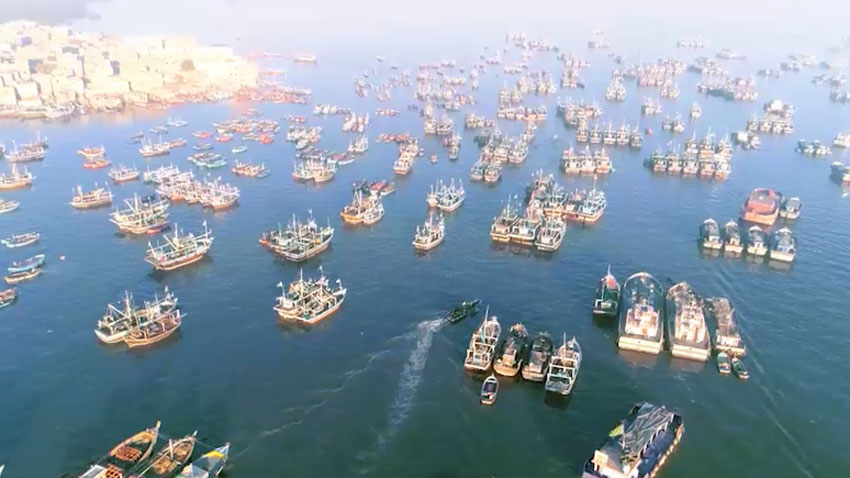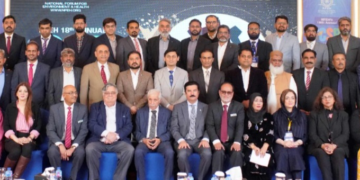The International Maritime Organization (IMO) celebrates World Maritime Day annually for highlighting the contribution of maritime industry in global economy. Each year, a specific theme related to maritime affairs is chosen for World Maritime Day. This year’s theme, “Seafarers: at the core of shipping future” is directed to spread awareness and pay gratitude to the endeavors of seafarers.
The shipping industry is responsible for carrying out approximately 80% by volume, and 70% by value of global trade. The importance of maritime trade is evident from the fact that any blockade of this traffic can yield major political, economic, and strategic consequences. There are over 50,000 merchant ships, transporting goods via Sea Lines of Communications (SLOCs). The SLOCs are, therefore, the lifelines of the global economy and the human element of these lifelines is represented by the seafarers.
Seafarers are the workforce, which is employed to undertake ship-borne duties. These duties include ships’ regular operations, vessel maintenance, general repairs, damage control, and all onboard tasks which enable the functionality of a ship. The choice of a seafarer-centric theme for World Maritime Day, is an acknowledgement of the efforts that seafarers make to ensure smooth flow of global maritime economy.
The estimated strength of seafarer community is believed to be over 1.6 million. China, Philippines, Indonesia, Russia, and Ukraine are the largest supplier of seafarers’ workforce. Despite being such an important work community, seafarers are generally overlooked. They face harsh weather conditions, medical hazards, shortage of basic facilities, work overload, social isolation and related psychological challenges. Moreover, they face persistent security threats from pirates and in many cases are also vulnerable to maritime terrorism when transiting through volatile waters. Despite this, their arduous job remains underappreciated. This World Maritime day aims to educate the public and the authorities to concede seafarers’ job, identify the issues seafarer community is facing, and take appropriate measures to rectify those issues.
The eruption of Covid-19 pandemic disrupted the momentum of maritime industry. As per Maritime Transport Review, maritime trade is projected to contract by a margin of 4.1% this year. The slowing down of maritime trade has also decelerated the global economy. Seafarers, in particular, have found themselves at the forefront of these challenging circumstances. When abrupt and strict travel restrictions were imposed by governments, many seafarers were left stranded in open seas for months with supplies’ scarcity. The abandonment of seafarers in open seas has unfolded a humanitarian crisis. For months, no credible recovery measures were taken by any government or organization to resolve this crisis.
Similarly, the sluggish global maritime activity has also triggered a wave of unemployment within seafarer community. This human crisis in shipping industry is still ongoing, and is feared to cause long term inhibiting impact on global maritime trade. Being a pivot of shipping industry, the seafarers are in need of identifying as primary human assets.
In his statement for year 2021 maritime day theme, IMO General Secretary Kitack Lim, encouraged governments to designate seafarers as key workers as per recommendations of United Nations General Assembly Resolution. The designation of keyworkers will help to secure vaccination prioritization for seafarers. Previously, in a joint statement, World Health Organization (WHO), International Maritime Organization (IMO), International Civil Aviation Organization (ICAO), International Labor Organization (ILO), have also advocated the need of vaccinating the air crew and seafarers on preference basis.
World Economic Forum and many large firms have signed Neptune Declaration on seafarer well-being. The signatory of this declaration have also called for prompt and unified action from governments and other stakeholders to safeguard the living and livelihood of seafarers. These recommendations are made with the belief that the transportation workers are of pivotal role in supporting global trade which is essential for a viable socio-economic recovery. A roadmap for vaccinating international seafarers has been crafted, but slow-moving vaccine drive still pose the risks of worsening already worse shipping chaos.
The recovery of maritime shipping is also important for combating Covid-19 pandemic in the longer run. The initial preference for vaccine transport has been given to the air medium due to quick delivery requirements. However, due to high costs involved, air medium is economically far less feasible than the maritime option. Therefore, for bulk transportation of life-saving equipment, vaccines stocks, and other humanitarian supplies on global scale, shipping and container industry will come into play. In that case, seafarers will play pivotal role in enabling the smooth transit of humanitarian supplies around the globe.



















